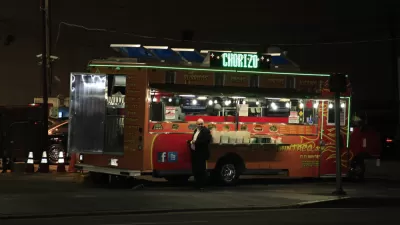The replacement of retail establishments with restaurants in America’s urban centers has a demographic slant.
The shift from shopping to eating cannot be explained solely in terms of the triumph of online over brick-and-mortar retailing, Aaron Betsky writes. Instead, the transformation of urban commercial space is linked to broader changes in the nation’s upper-middle class culture. Wealthy Americans are eating more, period, and cooking at home less. Moreover, we’ve come to expect more options in terms of special diets and ethnic cuisines.
The rise of the downtown eatery is also connected to residential sprawl. “As sprawl itself spreads, downtown areas become magnets for social activities, rather than for work, living, or shopping, and the bar or restaurant is the anchor of many such interactions,” Betsky writes.
But access to what Betsky calls “food jungles” is limited to those with the means to travel from suburb to city for dinner, and to pay for the meal. The urban poor remain stranded in food deserts, with no real change in their menu in sight.
FULL STORY: You Are Where You Eat: Let Them Eat Downtown

Planetizen Federal Action Tracker
A weekly monitor of how Trump’s orders and actions are impacting planners and planning in America.

Chicago’s Ghost Rails
Just beneath the surface of the modern city lie the remnants of its expansive early 20th-century streetcar system.

San Antonio and Austin are Fusing Into one Massive Megaregion
The region spanning the two central Texas cities is growing fast, posing challenges for local infrastructure and water supplies.

Since Zion's Shuttles Went Electric “The Smog is Gone”
Visitors to Zion National Park can enjoy the canyon via the nation’s first fully electric park shuttle system.

Trump Distributing DOT Safety Funds at 1/10 Rate of Biden
Funds for Safe Streets and other transportation safety and equity programs are being held up by administrative reviews and conflicts with the Trump administration’s priorities.

German Cities Subsidize Taxis for Women Amid Wave of Violence
Free or low-cost taxi rides can help women navigate cities more safely, but critics say the programs don't address the root causes of violence against women.
Urban Design for Planners 1: Software Tools
This six-course series explores essential urban design concepts using open source software and equips planners with the tools they need to participate fully in the urban design process.
Planning for Universal Design
Learn the tools for implementing Universal Design in planning regulations.
planning NEXT
Appalachian Highlands Housing Partners
Mpact (founded as Rail~Volution)
City of Camden Redevelopment Agency
City of Astoria
City of Portland
City of Laramie



























